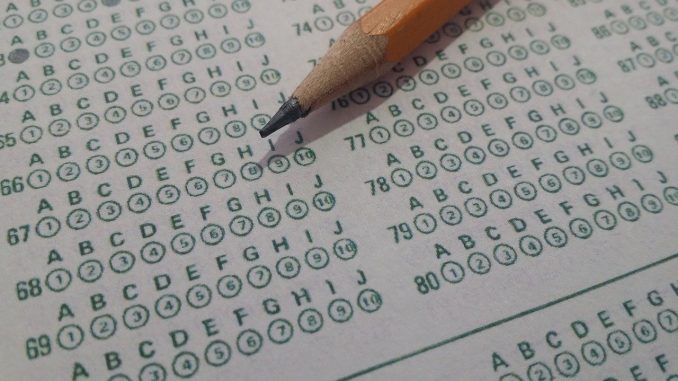
RALEIGH — Members of the State Board of Education unanimously approved submitting a federal waiver to cancel required end of school testing and accountability measures. Hours later, Gov. Roy Cooper announced a new executive order which will keep North Carolina K-12 schools closed through May 15.
On March 20, the U.S. Dept. of Education announced that states could apply for the waiver.
“Since student performance, as measured by assessments, is required to be used in statewide accountability systems, any state that receives a one-year waiver may also receive a waiver from the requirement that this testing data be used in the statewide accountability system due to the national emergency,” the U.S. Department of Education announcement reads.
The North Carolina tests being waived include end-of-grade (EOG) tests in reading and math for grade levels 3 through 8, science tests in grades 5 and 8 and end-of-course (EOC) tests in Math 1 and 3, biology and English 2.
The state’s A-F school performance grades and elements included in the state’s School Report Cards are also part of the waiver. Homeschools in the state are not included in this waiver and are still required to test their students.
During the emergency session call, State Board of Education chairman Eric Davis said that the board is continuing to work with state agencies “to take the necessary steps to maximize access to quality instruction and experiences for our students through the remainder of this year.”
Davis said they are working to make sure all school employees can continue to work safely with pay throughout this crisis.
“While closing schools for instruction was a difficult decision that has disrupted the lives of our students, teachers and families, it was the correct decision,” Davis said.
Chairman Davis also said that meal deliveries for students had gone from 200,000 to over 571,000 per day and that more than 1.6 million meals had been delivered since the governor gave the order to close schools.
“Efforts to raise student connectivity continue to increase, driven by the ingenuity and persistence of education leaders, the private sector and the generosity of many donors,” Davis said, adding that DPI has launched a website to deliver “timely relevant guidance, resources and information” to districts and schools.
“This time, while difficult, must be used to shift our current vision of education,” said Davis.
The call was turned over to J.B. Buxton, who chairs the Student and Learning Committee, who called on Dr. Tammy Howard to talk about the details of the waiver. Howard is the director of accountability for the state Department of Public Instruction.
Howard described the expedited one-year waiver and how it addresses assessments and accountability with regards to requirements in the Elementary and Secondary Education Act of 1965.
Reading the executive summary portion aloud, Howard noted that the waiver was being requested because “These closures are in response to extraordinary circumstances for which a national emergency has been duly declared by the President of the United States under the Robert T. Stafford Disaster Relief and Emergency Assistance Act and this action will protect the health and safety of students, staff, and our communities.”
“All assessments must be administered under conditions that ensure the data is valid and reliable, and we cannot do that at this time. And, likewise, there wouldn’t be any data available for the accountability measures for the 2019-20 school year,” Howard said.
Additionally, the waiver says that all local education agencies in the state will be given notice of this waiver and given the opportunity to comment on this request.
In response to a question from board member Olivia Oxendine about accountability requirements set by the General Assembly, Buxton said conversations with legislators have already started. He also indicated that staff from DPI are creating a list of what legislators need to approve.
“Chairman Davis has already opened up some of those discussions with members of the legislature and let them know that in the wake of this submission, we’ll be coming to them with a full listing of state accountability requirements, ties to bonuses, etc. that we would request waivers from them consistent with this [federal waiver],” Buxton said.
In a press release on March 20, House Speaker Tim Moore (R-Cleveland) said that lawmakers had been apprised of the state testing requirements and would waive them for all North Carolina students, both public and private.
“We are communicating closely with the federal government and understand that as their testing is compromised, North Carolina should follow their lead in reducing these end-of-year requirements to assist school districts,” Moore said in the release.
Moore also prioritized ensuring child nutrition needs would continue to be met by repurposing roles of non-certified personnel. The House Speaker said that the General Assembly will have to look at calendar flexibility for schools and adjust the state-mandated number of school days.



